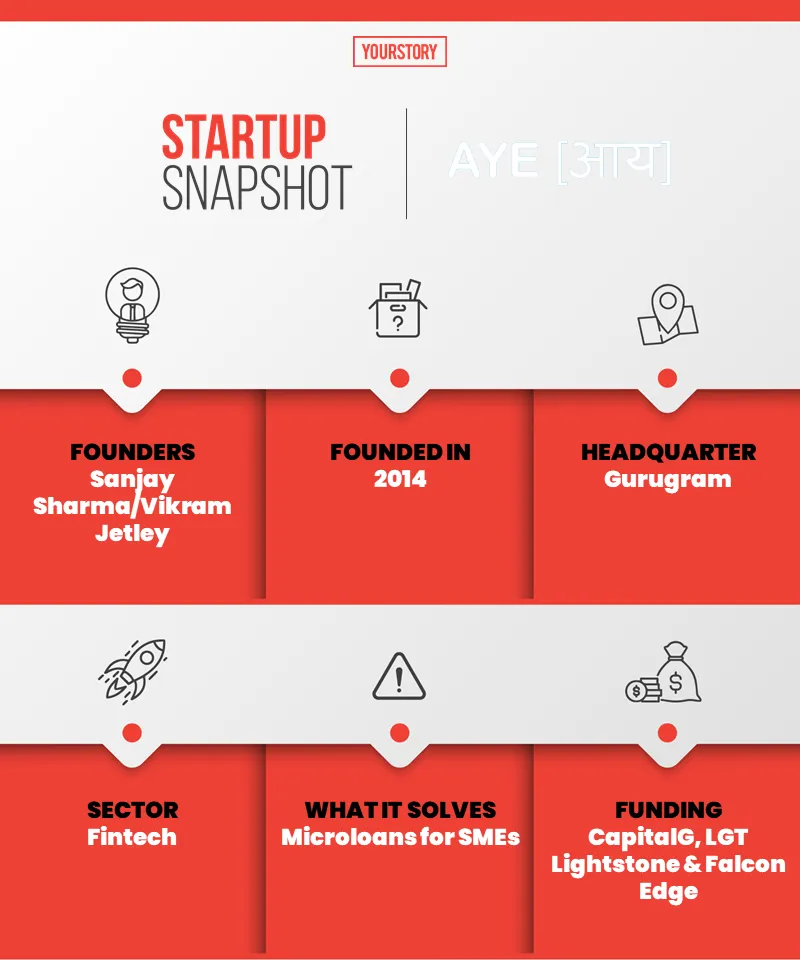Why this MSME lending startup believes it can grow big by lending to micro-enterprises
Gurugram-based MSME lending startup Aye Finance enables financial inclusion for micro-enterprises through tech-based processes to build credit insights. It doubled its revenue to Rs 410 crore this year.
Micro, Small and Medium Enterprises (MSME) form a large portion of the industrial output and employment in India. According to FICCI, about 60 million MSMEs employ over 11 crore people that deliver over 45 percent of the country’s industrial output by value.
Despite being a critical sector to the economic growth, MSMEs and micro-enterprises, in particular, continue to struggle.
The biggest pain point continues to be a lack of adequate and timely credit and efficient underwriting systems that supply credit to micro-enterprises.
Legacy credit systems do not have significant data on their credit histories, and traditional banking and financial institutions see servicing micro-enterprises' credit requirements as expensive because of the small ticket size of the loans.
Founded in 2014 by Sanjay Sharma and Vikram Jetley, Gurugram-based aims to address this problem by enabling financial inclusion for micro-enterprises through tech-based processes to build credit insights.
"We have disrupted the status quo with innovative credit assessment methods that do not rely on traditional business documentation and methods. We have leveraged the advancement in data analytics and technology to not only make sound risk assessments but also simplify the lending process, reduce their borrowing costs, and enhance customer experience," says Sanjay.
The early days
Sanjay was working in a housing finance company at a leadership position in the UAE before he decided to head back to India to look for opportunities to contribute to social impact in 2013.
Vikram, on the other hand, worked with HDFC Bank and National Bank of Oman. The duo got together in 2013 to pursue this opportunity of lending for social impact.
A government report published around the time said the micro-finance industry has been facing a credit deficit of Rs 16 trillion. This is where Sanjay and Vikram found their opportunity.
"This search led me to work with the micro-finance industry. I believe there is a lot to learn when there is turmoil in the market, and this job prepared me for the bold step of setting up a new-age finance company that purely focusses on lending working capital to micro-enterprises," says Sanjay.
The founders conducted detailed field research that involved meeting over 300 micro-enterprises across five cities and six manufacturing industry clusters.

Aye Finance team
Sanjay studied clusters such as lac bangle-making in Jaipur, brass casting in Aligarh, sporting goods manufacturing in Meerut, shoe-making in Agra, and shoes and garments manufacturing in Delhi.
This led the duo to explore the possibility of using a cluster-based underwriting methodology for credit assessment of these grassroots businesses, and they set up Aye Finance.
The solution
Aye’s proprietary “cluster-based credit assessment” methodology allows it to make lending decisions in the absence of traditional business documentation and prior credit history. It uses a variety of credit assessment tools that focus on data analytics, customer profiling, and behavioural science for risk selection.
"Micro-enterprises have little documentary proof of their business income, which makes underwriting such businesses a big problem. With loans often between Rs 50,000 and Rs 100,000, it is important to design processes and automation that execute the disbursal of these loans at minimal costs," says Sanjay.
In March 2014, Aye disbursed its first loan to a micro-entrepreneur in the ladies’ shoes manufacturing cluster in Delhi. The entrepreneur, who had a setup of six workers, had taken no loans from any formal bank or NBFC before. It manufactured 200 shoes and sandals per week exclusively for women.
After successfully meeting the shoe manufacturer’s credit requirements, Aye Finance went from zero to over Rs 1 crore in disbursements in less than six months.
"Acute paucity of working capital has long been an existential pain point of micro-enterprises. Aye is solving this through its innovative cluster-based underwriting, by making a ground-level connect with India’s thriving MSME sector, and offering customised business loans to micro-enterprises," Sanjay says.
Since then, it has multiplied its footprint to 173 branches in 18 Indian states and has disbursed loans worth Rs 3,300 crore to over 2,30,000 Indian micro-enterprises.

The business model
Aye offers Rs 1-3 lakh of a borrowing line in the form of working capital to micro-enterprise owners, who typically have annual sales of Rs 25- 50 lakh. It has doubled its revenue in FY2019-20 to Rs 410 crore.
The startup launched FAME in 2019 (Foundation for Advancement of Micro Enterprises) to run its corporate social responsibility (CSR) initiatives. The project was first launched for sports goods manufacturers in Meerut. With FAME’s support, one of Aye's members listed his cricket balls on Amazon.in and managed to sell all his products within 24 hours of listing them.
Through this initiative, the startup continues to offer credit to marble inlay workers from Agra, manufacturers of ladies’ shoes from Delhi, creators of wooden toys from Channapatna, silk saree weavers from Kanchipuram, cricket ball manufacturers from Meerut, and other innumerable others, that are keeping the spirit of entrepreneurship alive in India.
Re-defining credit access mechanisms for micro-enterprises
Over the last decade, several NBFCs have stepped up to meet the credit deficit in the MSME sector, particularly micro-enterprises, by working around the obstacles of a lack of financial information of these businesses.
They brought about innovations not only in the credit assessment of this sector but also in the product, design, and sales processes.
However, there is a difference between the way established NBFCs and new-age ones operate. New-age NBFCs offer innovative products designed specifically for this sector — peer-to-peer lending, occupation-specific products, and invoice discounting, which they do by using software and data extrapolations at scale.
Aye uses machine learning to make improved lending decisions in the absence of business documentation by consolidating data points from various social and demographic sources. This allows for a larger number of micro-businesses, who traditionally have not been able to access funds from organised sources to be brought into the inclusive folds of formal lending.
The challenges
In the early days, Vikram and Sanjay found it challenging to build a team of leaders who were socially motivated, and who would accept reasonable compensation for the hard job of lending to micro and small enterprises.
There were hardly any prior success stories to guide the startup, and when they consulted with bankers or professionals from development financial organisations, they would not take their plans seriously.
"They thought that we were commercial bankers, who would soon have other thoughts when the hardship of social business became apparent. This negativity is always one big challenge that is faced in such situations," says Sanjay.
Funding and future plans
Aye Finance was started with a sum of Rs 5 crore in 2014 raised by the founder from friends and angel investors, who believed in the company.
"Our ambition to be a large-scale business has been ably supported by a set of large private equity investors right since our inception. We have raised four rounds of equity in the last five years, and most of the investors have invested in multiple equity rounds since the seed stage. This demonstrates their comfort with us and commitment to our business," says Sanjay Sharma.
In June this year, the startup raised Rs 210 crore in Series E round led by CapitalG, Alphabet Inc, with participation from LGT Lightstone, Falcon Edge Capital, A91 Partners, and MAJ Invest. With this, Aye’s total equity funding since inception exceeds Rs 690 crore.

Aye Finance cofounder Sanjay Sharma
It also has debt lines from global impact and investment funds (FMO, Blue Orchard, TripleJump, Microvest, etc.), public and private sector banks (SBI, ICICI Bank, HDFC, etc.), and large NBFCs (Mahindra & Mahindra, Hinduja Leyland, etc.), that support the startup in its mission to create a more inclusive India.
In the next 18 months, it aims to find and support new businesses that are growing even during the COVID-19. Moreover, it aims to stabilise growth because of the economic slowdown created by the pandemic.
Edited by Suman Singh




1560854527902.jpg?fm=png&auto=format&h=100&w=100&crop=entropy&fit=crop)




